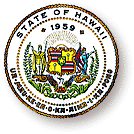
Lingle’s tax hike
idea hits gridlockSenate Republicans do not
want to raise taxes to pay for
a mass transit system
Gov. Linda Lingle's call for a tax increase to pay for an ambitious new mass transit system has failed to generate support.
On Monday, Lingle and city and state officials announced proposed solutions to Oahu's traffic congestion that include a $2.6 billion rail transit system and a $200 million elevated road above Nimitz Highway. The preliminary plan won immediate bipartisan praise, but legislative and other leaders were not embracing Lingle's call for higher taxes.
Senate Republicans voted yesterday to take a caucus position against the increase.
"I support the concept and I applaud the governor for bringing people together, but I can not support a tax increase," said Sen. Fred Hemmings, GOP Senate leader.
Hemmings said he had told Lingle on Monday that he could not support a tax increase.
Hawaii Kai Republican Sen. Sam Slom went further, saying he didn't like either the plan or the tax increase.
"I am absolutely opposed to tax increases and opposed to the fixed rail concept. ... I am disappointed that the governor is going to abridge her most vaunted no-tax pledge," Slom said.
The Republican House leader, Rep. Galen Fox, said he also had taken a pledge not to vote for a tax increase, so he was considering various aspects of this tax proposal.
If the tax was imposed only for the construction of the rail line, Fox said, it could be considered a user fee, which wasn't part of the no-new-taxes pledge. "But it is quite possible that the tax proposal would be too high for me to support," he added.
Democrats also hailed the plan, which is scheduled to be completed by 2018, but backed away from support of a tax increase.
House Speaker Calvin Say, a Democrat, said the transit line is needed and 10 years ago the Legislature approved a plan to permit the Honolulu City Council to raise the excise tax in Honolulu by half a percent to fund a transit line. While that plan passed the Legislature, it failed by one vote in the Council.
Say added that while he "would be open" to a tax increase, it would depend upon Lingle asking for the increase and then the position of his fellow Democrats.
"If she doesn't come up with a proposal, we would have nothing to support," Say said.
Two key critics of the original plan, Hawaii Tax Foundation Director Lowell Kalapa and Cliff Slater, a leader of the Alliance for Traffic Improvement, said the new transit plan would not work.
"She needs a reality check," Kalapa said of Lingle. "The people who voted her into office were the most disgruntled about paying so much for government."
The transit plan would be fine, Kalapa added, if the state and county would pay for it by limiting spending and reallocating other resources.
Slater, who favors building a reversible two-lane highway from Waikele to downtown, said the logic of building any transit system is flawed.
"People use roads. You have to convince people to use mass transit," Slater said.
A new mayor will be at the helm of the city's transit decisions after next year.
Mayoral candidate Duke Bainum, the former City Council transportation chairman, said the light rail system tied into the city bus system is similar to what he has been supporting.
But Bainum said that talk about raising taxes is premature. He said it is better to wait for the overall cost of the project and learn how much federal funding can be obtained before deciding on taxes.
"I'd be concerned about any tax increase. With that said, I am aware that federal dollars will be difficult to obtain," Bainum said. "If a tax increase were required, I would certainly closely scrutinize any tax increase proposal and make absolutely sure the increase would result in a meaningful improvement in Oahu's traffic problems."
Opponent Mufi Hannemann said whether the state raises taxes or floats bonds to pay for a rail system, the taxpayer is going to get hit in the pocketbook.
"Our options are very limited given the dire financial straits the next mayor is going to inherit. Therefore this may be our only option but I've always said that tax increases should be looked upon as a last option," Hannemann said.
City Councilman Charles Djou, a Republican, said he doesn't like raising taxes either but sees a difference with the rail system being proposed.
"The taxpayers will see a tangible product at the very end. It's a little bit different. It doesn't mean though, however, that I'm enthusiastic about raising taxes."
Djou said that voters should be asked for their opinion. "Perhaps what needs to happen is send this to the voters and have the voters actually decide it on a ballot as to whether or not they like the idea of raising taxes," he said.
Councilman Donovan Dela Cruz, who is expected to become the new Council chairman tomorrow, said even though he represents parts of Central Oahu, the North Shore and Windward Oahu -- areas not served by the rail line -- the project will be good for his constituents as well.
"The less people we have on the road coming from Kapolei and Ewa, that means less congestion for people coming from the North Shore and Central Oahu."
But Dela Cruz said more information is needed before deciding on a tax hike.
